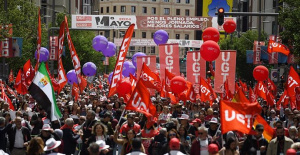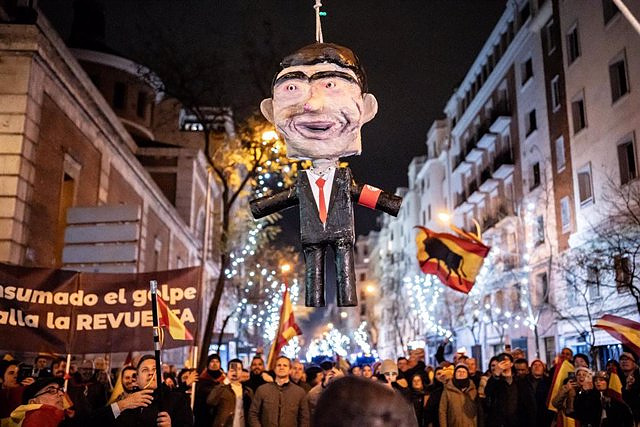The ECHR considered that burning an image of Juan Carlos I was a political criticism embedded in freedom of expression
MADRID, 2 Ene. (EUROPA PRESS) -
The burning of photos of King Juan Carlos I in 2008 or that of a doll of former Catalan president Carles Puigdemont in 2019 are some of the cases, in which the courts ruled out an alleged crime of inciting hatred, which preceded the beating that took place. last New Year's Eve to a piñata that simulated the president of the Government, Pedro Sánchez.
Legal sources consulted by Europa Press recall that it is only possible to appreciate the crime of inciting hatred when the action is directed at a protected minority in a vulnerable situation - a group discriminated against for reasons of race, religion, sexual orientation, for example - . In this sense, they emphasize that the President of the Government does not belong to this group but to a State institution.
On the sidelines, they specify that beyond the act of beating the head of the Executive, attention should be paid to whether mentions of the type "this is what should be done with him" were made. They insist that the fact that a doll is burned or beaten can be considered political criticism according to the doctrine of the European Court of Human Rights (ECHR), but they warn that a different issue would be adding phrases that fit into an alleged crime of provocation. to the commission of crimes.
Thus, they warn that, in the event that the events that took place near the PSOE headquarters on Ferraz Street in Madrid were conduct that could be prosecuted at a criminal level, the specific actors and not necessarily the organizers of the protest would have to be investigated. manifestation.
It should be remembered that the ECHR already established in 2018 that burning photos cannot be considered a manifestation of hate speech, but rather falls within freedom of expression in cases where it involves political criticism.
Strasbourg ruled in this way when condemning Spain to compensate the young Catalans Jaume Roura Capellera and Enric Stern Taulats, who had been sentenced by the National Court to 15 months in prison in 2008 for a crime of insulting the Crown - a penalty that was replaced by a fine of 2,700 euros-- for burning a photo of the Kings after a demonstration in Girona (Catalonia).
The ECtHR considered the sentence disproportionate, understanding that the events were part of the political debate and that institutions such as the Crown are not exempt from political criticism. As he explained then, freedom of expression only excludes conduct that propagates, incites or justifies racial hatred, xenophobia, anti-Semitism or other forms of hatred based on intolerance.
After analyzing that case, the European court concluded that the intention of those convicted was not to incite the commission of acts of violence against the person of the King, but rather an act of expression of "dissatisfaction and protest."
In 2019, a year after the ECHR ruled, a demonstration took place in Coripe (Seville) within the framework of the local festival of the 'Burning of Judas' in which a doll representing the former Catalan president was burned and shot. Carles Puigdemont. The Generalitat of Catalonia filed a complaint, but the Provincial Prosecutor's Office of Seville archived the proceedings, considering that the events did not constitute a crime of incitement to hatred or discrimination for ideological reasons.
In 2023, however, a criminal court in Castellón did see a crime in the actions of a man who in 2020 hung from a tree a doll with the face of the Vox leader, Santiago Abascal, which had red spots simulating gunshots.
Although he was acquitted of the crime of inciting hatred, he was sentenced to eight months in prison for the crime of threats. There was an appeal against this decision before the Provincial Court.
However, the events that took place last New Year's Eve in Madrid have not yet been prosecuted. At the moment, the PSOE has not filed legal actions and no investigation has been opened in the courts, according to the legal sources consulted.
This Tuesday, the spokesperson for the Socialists in Congress, Patxi López, assured - in an interview on Cadena Ser, collected by Europa Press - that the party's legal team is studying "all legal avenues" regarding the concentration. in Ferraz, since for the PSOE these acts are "within what is a hate crime."
"We want those guilty of this to be brought to justice and if it is a crime they pay. We want to stop these actions," he added, admitting however that "there is a very fine line" and that the socialists have opened a debate on the freedom of expression, which like "any freedom in democracy has to have limits."
Giving as an example the debate that Congress will host on the decriminalization of insults to the Crown or the glorification of terrorism, the PSOE spokesperson recalled that they are not supporters of the latter but that they want there to be "a serious debate in this country." on "those issues", since it is necessary to know "where the limits of freedom of expression really are".

 Exploring Cardano: Inner Workings and Advantages of this Cryptocurrency
Exploring Cardano: Inner Workings and Advantages of this Cryptocurrency Seville.- Economy.- Innova.- STSA inaugurates its new painting and sealing hangar in San Pablo, for 18 million
Seville.- Economy.- Innova.- STSA inaugurates its new painting and sealing hangar in San Pablo, for 18 million Innova.- More than 300 volunteers join the Andalucía Compromiso Digital network in one month to facilitate access to ICT
Innova.- More than 300 volunteers join the Andalucía Compromiso Digital network in one month to facilitate access to ICT Innova.-AMP.- Ayesa acquires 51% of Sadiel, which will create new technological engineering products and expand markets
Innova.-AMP.- Ayesa acquires 51% of Sadiel, which will create new technological engineering products and expand markets UGT and CCOO demand the regeneration of democracy, better salaries and a reduction in working hours
UGT and CCOO demand the regeneration of democracy, better salaries and a reduction in working hours Alcaraz gives up his reign in Madrid against Rublev
Alcaraz gives up his reign in Madrid against Rublev Petro announces that Colombia will break diplomatic relations with Israel
Petro announces that Colombia will break diplomatic relations with Israel The Fed maintains rates and gives the ECB the initiative to reverse monetary restriction
The Fed maintains rates and gives the ECB the initiative to reverse monetary restriction How Blockchain in being used to shape the future
How Blockchain in being used to shape the future Not just BTC and ETH: Here Are Some More Interesting Coins Worth Focusing on
Not just BTC and ETH: Here Are Some More Interesting Coins Worth Focusing on Ivace and promotes a less invasive device for the early detection of prostate cancer
Ivace and promotes a less invasive device for the early detection of prostate cancer Valencia unanimously approves the ordinance to allocate spaces to test innovative initiatives
Valencia unanimously approves the ordinance to allocate spaces to test innovative initiatives UPV researchers promote a paid master's degree as a "talent factory" in integrated photonics
UPV researchers promote a paid master's degree as a "talent factory" in integrated photonics A spin-off of the UV works on obtaining high-resolution 3D biomedical images in real time
A spin-off of the UV works on obtaining high-resolution 3D biomedical images in real time A million people demonstrate in France against Macron's pension reform
A million people demonstrate in France against Macron's pension reform Russia launches several missiles against "critical infrastructure" in the city of Zaporizhia
Russia launches several missiles against "critical infrastructure" in the city of Zaporizhia A "procession" remembers the dead of the Calabria shipwreck as bodies continue to wash up on the shore
A "procession" remembers the dead of the Calabria shipwreck as bodies continue to wash up on the shore Prison sentences handed down for three prominent Hong Kong pro-democracy activists
Prison sentences handed down for three prominent Hong Kong pro-democracy activists ETH continues to leave trading platforms, Ethereum balance on exchanges lowest in 3 years
ETH continues to leave trading platforms, Ethereum balance on exchanges lowest in 3 years Investors invest $450 million in Consensys, Ethereum incubator now valued at $7 billion
Investors invest $450 million in Consensys, Ethereum incubator now valued at $7 billion Alchemy Integrates Ethereum L2 Product Starknet to Enhance Web3 Scalability at a Price 100x Lower Than L1 Fees
Alchemy Integrates Ethereum L2 Product Starknet to Enhance Web3 Scalability at a Price 100x Lower Than L1 Fees Mining Report: Bitcoin's Electricity Consumption Declines by 25% in Q1 2022
Mining Report: Bitcoin's Electricity Consumption Declines by 25% in Q1 2022 Oil-to-Bitcoin Mining Firm Crusoe Energy Systems Raised $505 Million
Oil-to-Bitcoin Mining Firm Crusoe Energy Systems Raised $505 Million Microbt reveals the latest Bitcoin mining rigs -- Machines produce up to 126 TH/s with custom 5nm chip design
Microbt reveals the latest Bitcoin mining rigs -- Machines produce up to 126 TH/s with custom 5nm chip design Bitcoin's Mining Difficulty Hits a Lifetime High, With More Than 90% of BTC Supply Issued
Bitcoin's Mining Difficulty Hits a Lifetime High, With More Than 90% of BTC Supply Issued The Biggest Movers are Near, EOS, and RUNE during Friday's Selloff
The Biggest Movers are Near, EOS, and RUNE during Friday's Selloff Global Markets Spooked by a Hawkish Fed and Covid, Stocks and Crypto Gain After Musk Buys Twitter
Global Markets Spooked by a Hawkish Fed and Covid, Stocks and Crypto Gain After Musk Buys Twitter Bitso to offset carbon emissions from the Trading Platform's ERC20, ETH, and BTC Transactions
Bitso to offset carbon emissions from the Trading Platform's ERC20, ETH, and BTC Transactions Draftkings Announces 2022 College Hoops NFT Selection for March Madness
Draftkings Announces 2022 College Hoops NFT Selection for March Madness























